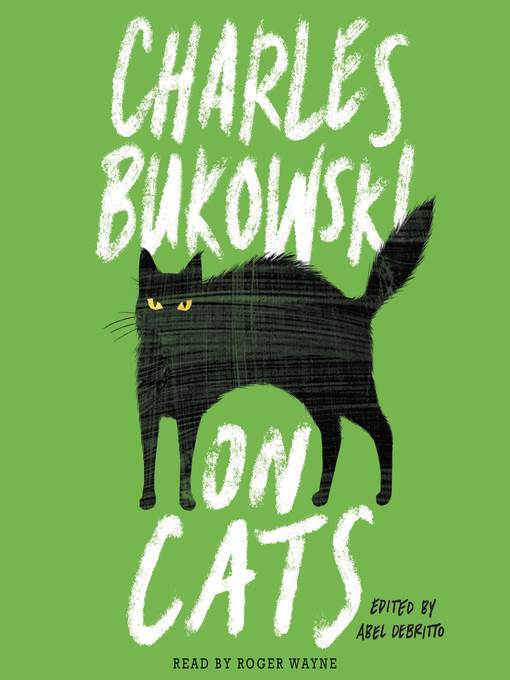
On Cats
کتاب های مرتبط
- اطلاعات
- نقد و بررسی
- دیدگاه کاربران
نقد و بررسی

Roll over, roll over! With these unlikely words, narrator Roger Wayne takes listeners on an occasionally exasperating but always exhilarating look at cat ownership. This previously unpublished collection of short prose and poetry offers a surprisingly intimate look at writer Charles Bukowski, who is typically seen as a womanizing tough guy. Wayne deftly conveys his descriptions of the fighters, hunters, and survivors that are his favorite pet. Most amusing is Wayne's account of Bukowski relaxing in the bathtub with a cigar and THE NEW YORKER--until his cat decides to join him. She soon drenches the magazine and unravels his fine cigar. Wayne's conversational style offers a warm and loving look at Bukowski and his feline companions that will forever change his image. S.G.B. © AudioFile 2015, Portland, Maine

January 1, 2002
The quiet desperation and the long perspectives of middle-American comfort provided the deftly handled and uncommonly moving subjects for Morris (1931-1997), who transformed them into laconic, well-crafted poems. Morris' first book, Green Business (1970), established his topics and tones: quatrains and terse trimeter columns described an unlived life of desks and whiskey, of "suburban work/ You are not suited to," where "Whatever you do/ Occurs at a distance." Later books added historical subjects and mordant puns, making for a body of work always restrained, mostly sad, and often quotable. "Archaeology" begins "Almost nothing mysterious is/ To be found./ This attracts us." "At Forest Lawn Cemetery" (in Los Angeles) ends with Morris' plans to visit, next, "the Homes of the Stars/ And the Universal Lot." Strong poems address lost and realized hopes which link grandfathers to fathers, and fathers to sons: "They are what I would keep/ Until I leave them." Such musings on mortality and nostalgia made Morris the closest American poetry could get to Philip Larkin. Morris published his last book of verse in 1987; he devoted his last years to Then, an unfinished memoir. Born to genteel parents of some wealth, Morris saw his father recede into mental illness; his mother remarried in New York City, then moved the family to upstate New York and (after his stepfather's death) to North Carolina, from which he entered a military school. Two complete chapters about Morris' childhood show fine writing, but little to make his life stand out; the less-polished chapter on military school (and on his adult service in postwar Korea) offers more surprises. The real power lies in the poems; this very handsome selection, with its substantial, convincing introduction from Vendler, should certainly broaden his group of admirers. As a set, the books land midway between an in-house tribute (Morris taught at Washington University) and a serious effort to relaunch a neglected writer.

June 15, 2015
A curious collection of writings about cats, as the self-acknowledged Dirty Old Man of American letters celebrates his feline affinities and affection. Not nearly as substantial, provocative, or even interesting as this year's other posthumous Bukowski collection, On Writing, this slim volume features poems and prose pieces-mainly distinguished by the length and formatting-that focus on, feature, or merely mention cats. "I / dislike cute cat / poems / but I've written one / anyhow," writes the author in "My Cat, the Writer." Though Bukowski didn't care much for most of humanity, he did like cats a lot. Why? Because as the title of one poem puts it, "A Cat Is a Cat Is a Cat Is a Cat." The autobiographical pieces reveal that he shared his home with as many as a half-dozen cats at a time and that these cats would bite him, sleep with him (and wake him early), urinate on him, and fight with other cats. Mainly, they were indifferent to him, even his flatulence, and he greatly admired their lack of neediness and their self-possession. "If you're feeling bad," he writes, "you just look at the cats, you'll feel better, because they know that everything is, just as it is. There's nothing to get excited about. They just know. They're saviors. The more cats you have, the longer you live." Bukowski called them his teachers, and he clearly identified with them, especially the bedraggled and stray ones. Of a cat at the vet, somehow walking again after being run over by a car, he writes, "this cat is me. He came to the door starving to death. He knew right where to come. We're both bums off the street." Cat lovers won't confuse the author's verse with T.S. Eliot's, and Bukowski fans will find this of marginal significance.
COPYRIGHT(2015) Kirkus Reviews, ALL RIGHTS RESERVED.

























دیدگاه کاربران